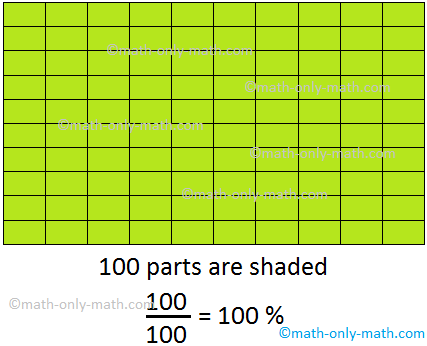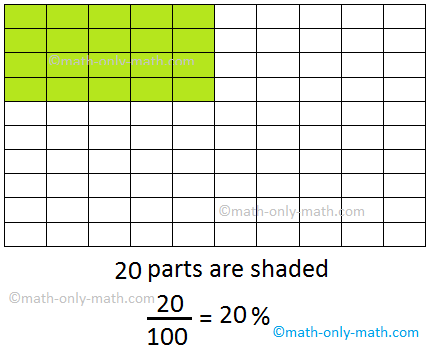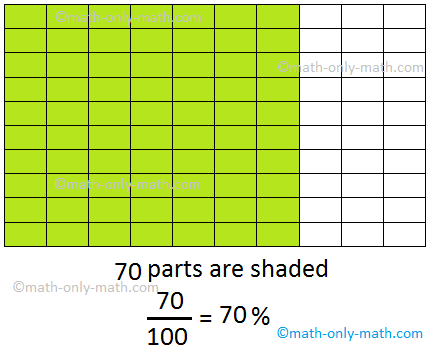Subscribe to our YouTube channel for the latest videos, updates, and tips.
PER CENT
Per cent means per hundred or for every hundred. When the denominator of a fraction is 100, we call it a percentage.
Suppose,
Robert gets 65 per cent marks in a monthly Test. It means he gets 65 marks for every hundred.
Again, if Anthony saves 35% of his salary, it means he saves $ 35 per hundred
The symbol for per cent is %.
For example: \(\frac{17}{100}\) = 17%
\(\frac{33}{100}\) = 33%
Definition of Percentage Video
Subscribe to our YouTube channel for the latest videos, updates, and tips.
A fraction with denominator 100 is called percentage and is denoted by the symbol %.
In our daily life, we see a lot of statements with numbers followed by a symbol %. A number followed by % is called a percentage or percent. The term percent comes from the Latin phrase per centum, meaning by the hundred. Percentage is another way of expressing a part of a whole.
One hundred percent of a quantity is \(\frac{100}{100}\) of it, for example if 40 students are enrolled in a class and all 40 are present on a particular day, then 100% of the class is present.
The word percent means per hundred or for every hundred. Thus, Clara got 83 marks out of 100 means; she got 83 percent marks.
Conversely, when a student scored 67 percent marks that means; the student scored 67 marks out of 100.
The symbol of percent is %.
Thus, 15 percent will be written as 15%
7/100 means 7%.
Conversely, 9% means 9/100.
On the status bar of our computer 100% indicates that the
battery is fully charged. Let us illustrate this by assuming that a battery is
made up of 100 small cells and each cell of the battery is represented by an
equal part on a square sheet. The shaded region in the following figures shows
the percentage of charge in a battery.
So, we can say that percentage represents parts her hundred.
Percentage is a fraction with 100 as its denominator.
Thus, 7% means 7 out of 100 = \(\frac{7}{100}\)
85% means 85 out of 100 = \(\frac{85}{100}\)
For example:
(i) 20/100 = 20%
[It is read as 20 percent]
(ii) 15/100 = 15%
[It is read as 15 percent]
(iii) 5/100 = 5%
[It is read as 5 percent]
(iv) 71/100 = 71%
[It is read as 71 percent]
(v) 89/100 = 89%
[It is read as 89 percent]
What is Percentage in Math? Short Video
To understand it more clearly, let us consider an example.
1. David secured 475 marks out of 500 and Jessica secured 392 marks out of 400. Who secured better marks and by what per cent?
Solution:
We can compare their marks by expressing them in per cent.
David got 475 marks out of 500.
475 marks out of 500 = \(\frac{475}{500}\) marks
= \(\frac{475 ÷ 5}{500 ÷ 5}\)
(We divide the numerator and the denominator both by 5 to make the denominator 100)
= \(\frac{95}{100}\)
= 95 x \(\frac{1}{100}\)
= 95%
So, David secured 95 marks per hundred or 95% marks.
Jessica got 392 marks out of 400.
392 marks out of 400 = \(\frac{392}{400}\) marks
= \(\frac{392 ÷ 4}{400 ÷ 4}\)
(We divide the numerator and the denominator both by 4 to make the denominator 100)
= \(\frac{98}{100}\)
= 98 x \(\frac{1}{100}\)
= 98%
So, Jessica secured 98 marks per hundred or 98% marks.
Now, it is clear that Jessica secured better marks. She secured 2% more marks than David.
To Convert a Percentage into a Fraction
To Convert a Fraction into a Percentage
To find the percent of a given number
To find what Per cent is one Number of another Number
To Calculate a Number when its Percentage is Known
From What is a percentage in math? to HOME PAGE
Didn’t find what you were looking for? Or want to know more information
about Math Only Math.
Use this Google Search to find what you need.













